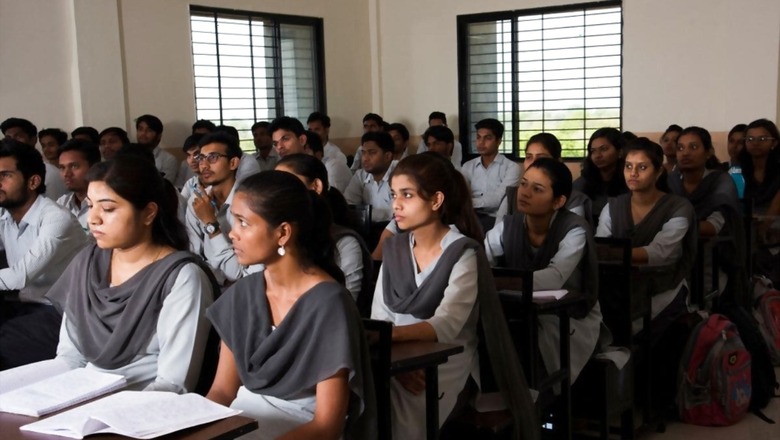
views
The final proposal on the evaluation model as proposed by CBSE gives 40 per cent weightage to Class 12 examinations (internal assessments, pre-boards and half-yearly combined) and 60 per cent weightage to historical data—in a 30:30 ratio for the results obtained in Classes 10 and 11. While one can endlessly argue over the fairness or otherwise of such a proposal, one must proceed keeping in mind the fact that this has indeed been an unprecedented year. It is true that the pandemic struck us last year but by that time at least three-fourth of the board papers had been conducted and so extrapolating the marks obtained in the best three or four papers to arrive at a final score didn’t assume vexed proportionalities then.
It is also true no matter what other permutations and combinations may be offered, the prospect of some discontented voices and instances of discrepancies would always remain and can never be ruled out in their entirety. And so, it will only be in fairness of things that adequate attempts be made to address them by all possible means.
Establishment of a robust grievance redressal system must precede the implementation of the proposal. But given the unparalleled situation that we are in, adequate reliance on historical data along with due weightage to the performance in Class 12 by the Central Board of Secondary Education (CBSE) certainly appears intuitive.
A Fair Assessment
There could be, for instance, an argument specifying that it is not a guarantee that those who may not have done well in class tests or half-yearly exams or even in the 10th boards would certainly not do well in the final Class 12 boards. But experience tells us that generally such cases are exceptions and not the rule. What is certainly true is the fact that students who are sincere, methodical and have been consistent in their academic performances over the years tend to do well in their summative assessments as well. In most cases, academic supervisors who have been consistently watching and supervising preparations are able to anticipate results with near accuracy.
This is because by the time students sit for board examinations, they generally become accustomed with the content of the syllabus and the forms and types of questions that could be asked, through in-house or other quarterly examinations. Different types of samplers only aid their preparation levels. It is actually these exams that prepare and set the tone for their final grade. Thus, students who have a history of successful performances are anticipated to do well in the final run as well.
This by no means, however, should be inferred as an endorsement of the idea of substituting singular summative examination with such a mechanism. Instead, it is simply an affirmation of what seems to be a rational step in the immediate run. Recall that many parents and educators have been in the past advocating the need for alternative assessments citing instances when students who have been otherwise getting good marks or grades in in-house examinations end up getting low scores in board examinations. The laments against a be-all and end-all examination system have been quite sturdy in the past.
ALSO READ | Fair, Neutral, Objective Indicator of Student’s Merit—Do Board Exams Meet Any of These Parameters?
Existence of qualitative disparities in curriculum, pedagogies, teachers training as well as infrastructural facilities between schools both within and across regions, cities, towns and villages either way imply that students haven’t been really competing on turfs of equity and candour. Such wider disparities make the playing field uneven and resultantly too unfair, particularly for students from poor-rural-illiterate-low caste backgrounds as they have to compete with students of elite private schools particularly for seats in institutions of higher learning. This is precisely why for years we have been listening to voices on why a final board examination may not be the best yardstick of arriving at a credible merit list.
The Challenges Ahead
Having said this, the exercise to accord marks in the 30:30:40 ratio in the imminent situation may not be as easy as it seems to be. Certain issues need to be looked at. The first and foremost is the credibility of the data that is produced by schools. The issue is a bit complex because while some eminent high-standard schools have commendable credibility in maintaining records with integrity, the same cannot be said for all schools.
Additionally, it involves the issue of integrity of certain state boards as well. This is important because inflated marking by boards would eventually lead to further skyrocketing of the already insane cut-offs for admissions in colleges, demeaning all yardsticks of just meritocracy. Giving 30 per cent weightage to Class 11 result may not find straight acceptance as students generally are involved in other co-curricular activities in that period. And so, the boards would do well to look at the numbers of Classes 10 and 12 and adopt moderation in arriving at numbers for Class 11. Boards will need to be sensitive to such eventualities. On their part, universities will need to be allowed to put in systems and structures of equivalence in place to ensure that ultimately admissions are genuinely reflective of the merit system that they profess to go by.
ALSO READ | CBSE Class 12 Scoring System: Marking by Schools is Prone to Inflation, Board Must Check That
For years, notwithstanding the recommendations of various committees and commissions, we haven’t actually addressed the issue in its entirety. Guided mostly by populist yearnings, educational reforms have at most been peripheral and cosmetic. The National Education Policy (NEP) holds certain laudable recommendations for effecting systematic assessments of cognitive psychomotor and affective performances of the learners so as to differentiate the competence levels of the proficient and the amateur. What is pertinent, however, is the need of a greater political will to execute the recommendations of the NEP. The pandemic has only forced us to recalibrate the system. A beginning has to be made and it must be made hereon.
Read all the Latest News, Breaking News and Coronavirus News here.


















Comments
0 comment